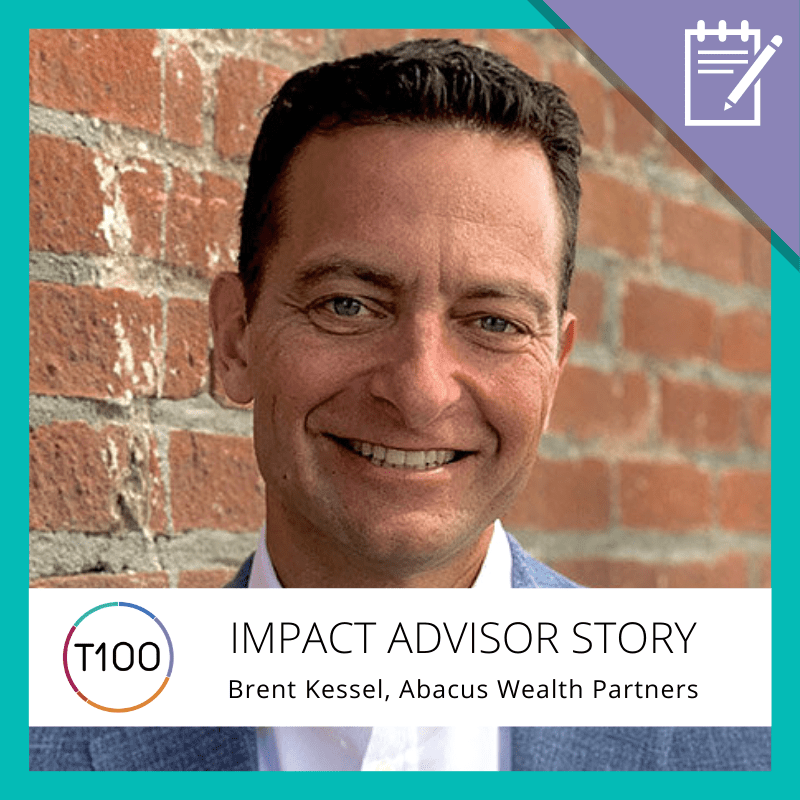In 1995, Brent Kessel went on a seven-week trip to India—and he had an epiphany. He and his girlfriend (who is now his wife) had gone to practice meditation and yoga. Kessel was five years out of college and feeling frustrated with how he’d been building his career working in the world of real estate mortgage. “It was too transactional a business for me,” he tells us. Suffice to say, there was a yearning that was sprawling in Kessel’s consciousness.
One day on that trip, he found himself sitting outside a telegram office an hour away from Bangalore (his girlfriend was inside sending a fax back home—these were the days before quick emails). Kessel was writing in his journal when he began to go deep. He started thinking about being on his “death bed and flashing over a life that, professionally” would have shown financing single-family home developments, shopping centers, and strip malls, he says.
“I basically said, that’s not going to work for me.”
It would be fair to discard this sentiment. To relegate it to a metaphorical bag of convictions often made—with good intentions—during trips to faraway lands. But Kessel followed through. He returned from India and immediately dug even deeper, exploring his passions of personal growth, psychology, and self-awareness. And he was always interested in finance and money and the role it plays in our lives. This all pointed Kessel to becoming a Certified Financial Planner. He enrolled in the course that same year. Eighteen months later, he had his certification and began filing the papers to start his firm, Abacus Wealth Partners.
Kessel talks about money and our relationship to it in a way that has so much meaning beyond the numbers, it seems like it rips open a new gateway. Using words like “values” that are so often void in financial conversations, Kessel’s work is driven by how so much of our financial identities have come to be formed by “shoulds” and expectations when really the conversation warrants space for discovery, intentions, and what truly matters to each of us. Kessel lays out a path that helps people “make conscious decisions with their money,” as he describes it. “And by conscious, I mean aware of their unconscious influences, all the behavioral things that are operating underneath.”
He also means self-supporting. In essence, really taking a deep look to discover your values and goals as opposed to falling in line with the cultural norms. As Kessel so clearly puts it, “If we don’t question it for ourselves and start with a clean slate, then we might be serving the wrong master.”
Abacus Wealth Partners assists its clients in becoming their own masters; helping them define their life—and the legacy they want to leave. Kessel, who is CEO, and his team focus on helping people make impactful decisions through innovative financial planning processes and evidence-based investment strategies. (This includes impact investing, which Kessel says is the fastest-growing part of the investment industry.) They make perceptive insights and rework the conversations around money so they’re inclusive and understandable, rather than elusive. This opens a portal that allows people to better understand their relationship to money and the layered history that feeds into the narratives surrounding it. And the key to changing any of it, as Kessel says, “is being aware of it.”
This inclusivity is evident throughout Kessel’s work. In his book, It’s Not About the Money, he unveils wisdom to help people of any socioeconomic status break free from the feeling of never having enough, and to gain a sense of financial choice. At Abacus, the firm offers a free five-minute quiz to help you understand your behavior around money. “There’s no right or wrong,” Kessel says about the quiz. “There’s no shaming.” The firm also offers its services pro bono to a select number of people each year, an effort to spread financial education to those who are too often left out of the conversation, something Kessel says adds to the wealth disparity issue.
That this compassionate attitude unwinds into a conversation about values today is no surprise given how the current pandemic has, in some form or another, shed a glaring light on the various issues plaguing humans. Inequality. Unstable health care systems. Racism. Food insecurity. Poverty. Climate change. These issues, as gigantic as they were before, are now like glaring strobe lights. It’s impossible not to see them. It is possible, however, to not acknowledge them. But not for Kessel. Using money as a means to directly and effectively make a positive impact is fundamental.
The operative word here is effective. Right now, Kessel says he’s been seeing an upswell of people wanting to use their money to help those impacted by COVID-19, but have little direction or strategic thought. Often the result of this is people giving or raising money for one fund that may have been more impactfully used—say, to feed children who are currently not getting the daily school lunch they depend on—in another way.
“A human being is a human being, and I want to look for where suffering is greatest and see where my money can go the furthest,”
he says. With this in mind, he and his Abacus team have put together an extensive resources page on ways to help those gravely impacted by the pandemic. The list, which includes ways to both give and receive help, is considered and thorough. It is also highly vetted and includes funding for areas where there is a great need. “I really believe in giving strategically and with effectiveness in mind rather than just giving with something that tugs on your heartstrings,” Kessel says.
Of course, for so many people, giving isn’t an option. The same can be said for saving and investing. As Kessel points out, the topic is simply irrelevant if you are living hand to mouth, and perhaps only have enough money or food on hand for the next few days. In wanting to actively make sure we’re connecting through these “bubbles of ethnicity and socioeconomic status” that we live in, Kessel touts a group calledGiveDirectly, a non-profit organization that allows you to send cash directly to an individual or family living in poverty.
One of the things Kessel says COVID-19 is showing us today is how interdependent we are. “Viruses don’t respect borders, walls, passport control,” he says, pointing out that it is very hard to be immune to the global economy these days. The pandemic is also showing many of us that we don’t need to consume at such a voracious pace. Kessel refers to chapter two in his book, which is about the “phenomenon of how the mind just keeps wanting.” He illuminates the concept of the “hedonic treadmill,” the idea that when we go after something and get it, we experience a hit of pleasure before quickly returning to a homeostatic level of happiness. “So then we need another hedonic kind of jolt to feel good,” he says.
The reality is, however, that many of us will go back to consuming at a similar rate as before the crisis. “I mean, unless someone is really able to […]pull back in a major, major way,” Kessel says. “I’m sure I’m going to go out to restaurants that I haven’t been able to go out to; I’m going to travel more because I’ve been traveling zero.” But Kessel is hopeful some learnings will carry through, that he’ll consume less, and less automatically. He wishes for people to pay close attention; to look deep and ask: Is there an unmet need underlying this purchase, this consumption, this behavior?
Because the best we can really do is to be mindful, Kessel brings this to his work each day. Whether we’re talking about money, time, career, jobs, or investing, one thing is guaranteed: It is all going to end one day. That is out of our control. What is in our control is how we spend our time—now.
“Do the thing with your life that you never need to retire from,” he says. “Engage in relationships and the activities that add value to others, give you a sense of purpose and belonging.”
In a time when things are engulfed in uncertainty, Kessel’’s wisdom comes as grounding counsel. It’s also financial planning 101, he says. “At this moment, with this shock to our consciousness about our surroundings and our future, I hope folks will say, ‘okay, so what is it I really love to do with my time and what’s the right balance of work and relaxation for me?’ and really go for that—and know that there are always five or six ways to make a financial plan work and invest differently.”
“There are so many options,” he continues, saying that he hopes people take this to heart “and really go for the life they want now […} rather than putting it off to the future.” This very sentiment poured into Kessel’s consciousness twenty-five years ago in India—and it continues to guide him today.
This article was originally published by The Conscious Investor.
Listen to a podcast featuring Brent Kessel discussing why impact investing will enjoy widespread adoption

